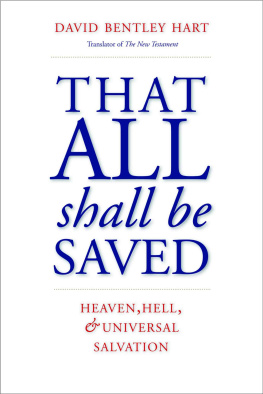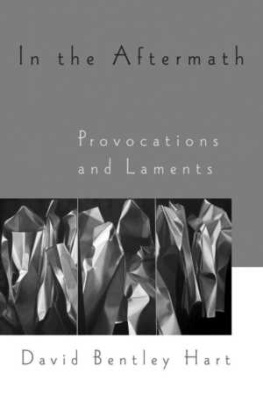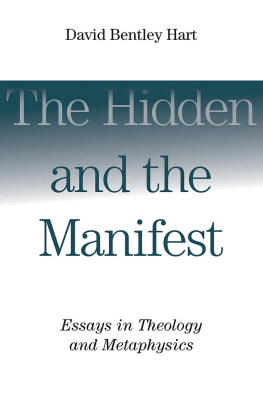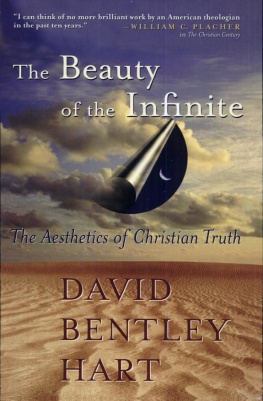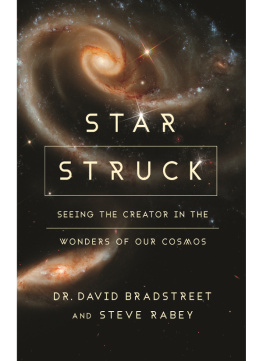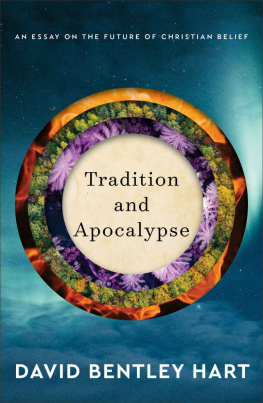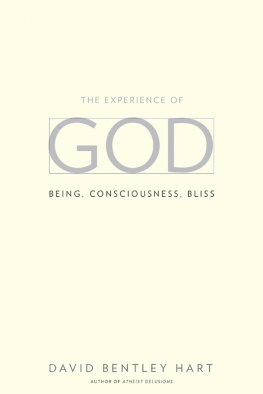That All Shall Be Saved
That All Shall Be Saved
Heaven, Hell, and Universal Salvation
DAVID BENTLEY HART

Published with assistance from the Louis Stern Memorial Fund.
Copyright 2019 by David Bentley Hart.
All rights reserved.
This book may not be reproduced, in whole or in part, including illustrations, in any form (beyond that copying permitted by Sections 107 and 108 of the U.S. Copyright Law and except by reviewers for the public press), without written permission from the publishers.
Yale University Press books may be purchased in quantity for educational, business, or promotional use. For information, please e-mail (U.K. office).
Set in Minion type by Tseng Information Systems, Inc.,
Durham, North Carolina.
Printed in the United States of America.
Library of Congress Control Number: 2019933695
ISBN 978-0-300-24622-3 (hardcover : alk. paper)
A catalogue record for this book is available from the British Library.
This paper meets the requirements of ANSI / NISO Z 39.48-1992
(Permanence of Paper).
10 9 8 7 6 5 4 3 2 1
For Narcis Tasca,
who reminded me of something that I was
in imminent danger of forgetting,
though it was something of the utmost importance
Our savior God intends that all human beings shall be saved and come to a full knowledge of the truth.
1 TIMOTHY 2:34
Contents
First Meditation:
Who Is God? The Moral Meaning of Creatio ex Nihilo
Second Meditation:
What Is Judgment? A Reflection on Biblical Eschatology
Third Meditation:
What Is a Person? A Reflection on the Divine Image
Fourth Meditation:
What Is Freedom? A Reflection on the Rational Will
Introduction
There have been Christian universalistsChristians, that is, who believe that in the end all persons will be saved and joined to God in Christsince the earliest centuries of the faith. In fact, all the historical evidence suggests that the universalist faction was at its most numerous, at least as a relative ratio of believers, in the churchs first half millennium. Augustine of Hippo (354430) referred to such persons as misericordes, the merciful-hearted, an epithet that for him apparently had something of a censorious ring to it (one, I confess, that is quite inaudible to me). In the early centuries they were not, for the most part, an especially eccentric company. They cherished the same scriptures as other Christians, worshipped in the same basilicas, lived the same sacramental lives. They even believed in hell, though not in its eternity; to them, hell was the fire of purification described by the Apostle Paul in the third chapter of 1 Corinthians, the healing assault of unyielding divine love upon obdurate souls, one that will save even those who in this life prove unworthy of heaven by burning away every last vestige of their wicked deeds. The universalists were not even necessarily at first a minority among the faithful, at least not everywhere. The great fourth-century church father Basil of Caesarea (c. 329379) once observed that, in his time, a large majority of his fellow Christians (at least, in the Greek-speaking Eastern Christian world that he knew) believed that hell was not everlasting, and that all in the end would attain salvation. This may have been hyperbole on his part, but then again it may very well not have been; and, even if he was exaggerating, he could not have been exaggerating very much, as otherwise the remark would have sounded silly to his contemporaries, whereas he stated the matter as something almost banal in its obviousness. Over time, of course, in large part as a result of certain obvious institutional imperatives, the voices of the universalists would dwindle away to little more than a secretive whisper at the margins of the faith, except in a few of the sunnier quarters of Christendom (such as the East Syrian church). And it was not, perhaps, until the nineteenth century that the tide of opinion on this matter began, if only ever so slightly, to turn back again.
Much of what I shall argue in this book, consequently, is likely to seem rather exotic to many readers, and perhaps even a little perverse. But this would not have been the case in, say, the first four centuries of the church, especially not in the eastern half of the Roman imperial world and its neighboring territories, precisely because the believers of those times and places were closer to the culture, language, cosmology, and religious expectations of the apostolic age; as yet, their imaginations had not been corrupted by centuries of theology written in entirely different spiritual and intellectual environments, and in alien tongues. My chief ambition in what follows, therefore, is to try to think through certain questions about the last things in a way that might naturally bring me nearer to the obscure origins of the Christian conception of reality, when the earliest texts of Christian scripture were still being written, edited, sorted through, and designated as either canonical or spurious. My hope is that I can assume a vantage somehow innocent of any number of presuppositions belonging to the inheritance of later developments in Christian culture. In a sense, in fact, I regard this book as a companion to, or additional piece in the critical apparatus of, my recent The New Testament: A Translation (Yale University Press, 2017). If possible (and I say this not simply in the hope of further increasing my sales), I hope the reader of this book can consult also the introduction and postscript of that volume, and perhaps the footnotes it provides for some of the verses cited here. Perhaps he or she might even read the translation in its entirety (I can vouch, if nothing else, for the good faith of the translator). I am firmly convinced that two millennia of dogmatic tradition have created in the minds of most of us a fundamentally misleading picture of a great many of the claims made in Christian scripture. And I hope that my translationsimply by restoring certain ambiguities I believe to be present in the original textsmight help modern readers understand how it is that a considerable number of educated late antique Eastern Christians, all of whom were familiar with the New Testament in the original Greek, felt entirely comfortable with a universalist construal of its language. It is my conviction, you see, that the misericordes have always been the ones who got the story right, to the degree that it is true at all. That is not to say that they were all in perfect agreement with one another, or that I am in perfect agreement with all of them regarding every aspect of that story. I mean only that, if Christianity taken as a whole is indeed an entirely coherent and credible system of belief, then the universalist understanding of its message is the only one possible. And, quite imprudently, I say that without the least hesitation or qualification.
I find it a very curious feeling, I admit, to write a book that is at odds with a body of received opinion so invincibly well-established that I know I cannot reasonably expect to persuade anyone of anything, except perhaps of my sincerity. The whole endeavor may very well turn out to be pointless in the end. I suspect that those who are already sympathetic to my position will approve of my argument to the extent that they think it successfully expresses their own views, or something proximate to them, while those who disagree (by far the larger party) will either dismiss it or (if they are very boring indeed) try to refute it by reasserting the traditional majority position in any number of very predictable, very shopworn manners. Some, for instance, will claim that universalism clearly contradicts the explicit language of scripture (it does not). Others will argue that universalism was decisively condemned as heretical by the fifth Ecumenical Council (it was not). The more adventurous will attempt what they take to be stronger versions of those same philosophical defenses of the idea of an eternal hell that I describe and reject in these pages. The most adventurous of all might attempt to come up with new arguments of their own (which is not advisable). There is no obvious way of winning at this game, or even of significantly altering the odds. Even so, I intend to play it to the end. And perhaps I can derive a certain comfort from my situation. There is, at the very least, something liberating about knowing that I have probably lost the rhetorical contest before it has even begun. It spares me the effort of feigning tentativeness or moderation or judicious doubt, in the daintily and soberly ceremonious way one is generally expected to do, and allows me instead to advance my claims in as unconstrained a manner as possible, and to see how far the line of reasoning they embody can be pursued. For all I know, this in itself might make some kind of worthwhile contribution to the larger conversation, even if in the end it should prove to be a suasive failure; if nothing else, this book may provide champions of the dominant view an occasion for honest reflection and scrupulous cerebration and serious analysis (and a whole host of other bracing intellectual virtues of that sort). Even if it should serve merely as a kind of negative probation of the traditionthe plaintiffs brief dutifully submitted by an
Next page
